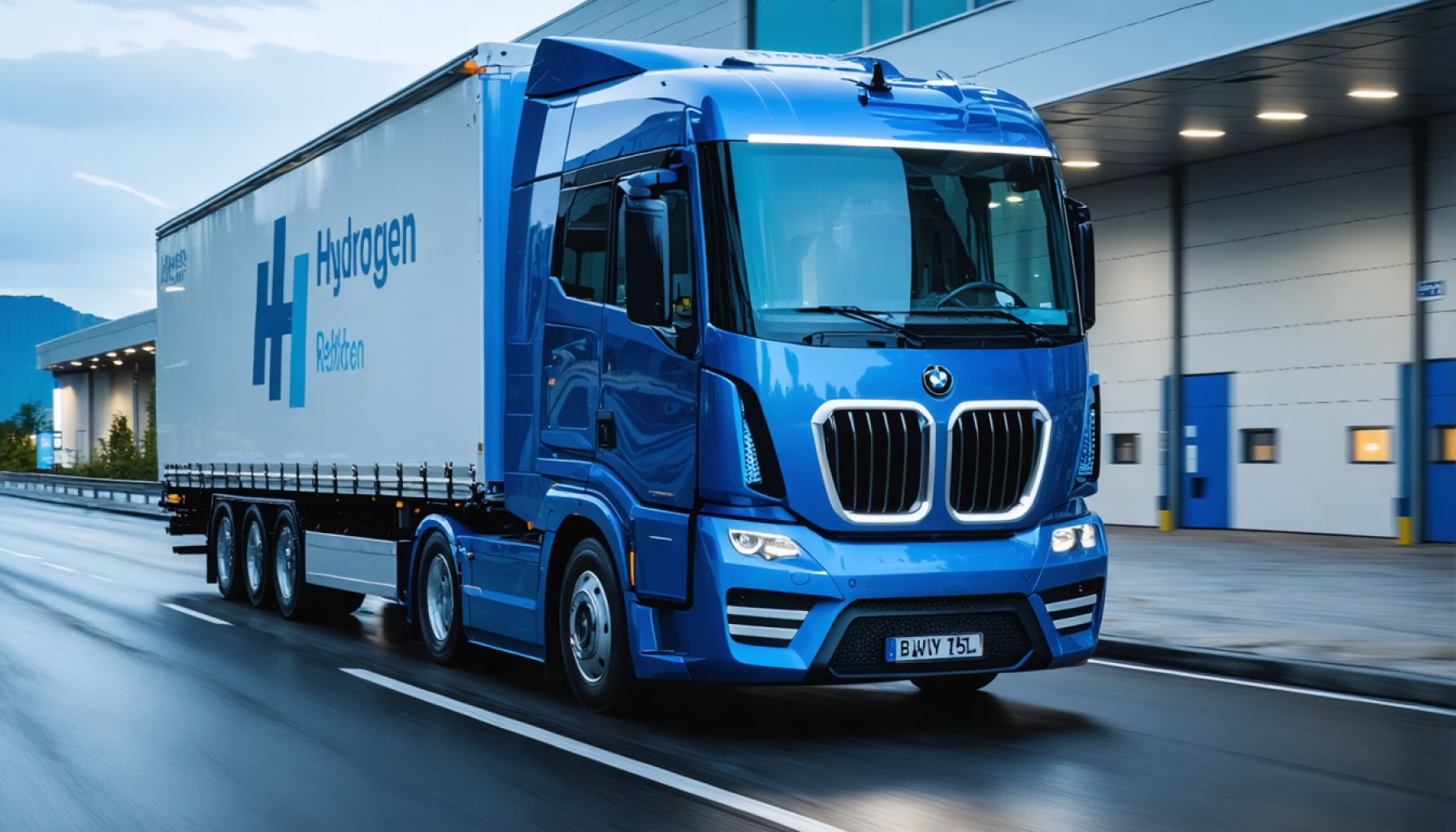- Arrival of Iveco hydrogen fuel cell trucks at BMW signifies a shift towards sustainable logistics.
- The trucks operate between Nuremberg, Landsberg, and Leipzig, enhancing BMW’s supply chain efficiency.
- TotalEnergies-Air Liquide partnership provides refueling stations, supplying hydrogen at 350 and 700 bar pressures.
- This initiative exemplifies the potential of hydrogen fuel in reducing emissions and fossil fuel reliance.
- The project in Leipzig is a model for global transport sustainability and innovation.
- The deployment underscores a commitment to implementing groundbreaking solutions for greener transport.
Under the steel-gray skies of Leipzig, a quiet revolution is unfolding with the arrival of two gleaming Iveco hydrogen fuel cell trucks at BMW’s doorstep. These aren’t just any trucks; they represent a leap toward a greener future, marking a significant stride in sustainable logistics. With the hum of their electric motors, these heavy-duty giants are set to traverse the route between Nuremberg, Landsberg, and Leipzig, forming a crucial link in BMW’s supply chain.
Picture this: the streamlined trucks gliding silently down the autobahn, powered purely by hydrogen cells. It’s a glimpse of a future where transport and environmental stewardship go hand in hand. Leipzig has embraced this future, thanks to the newly established refueling stations crafted by the TotalEnergies-Air Liquide partnership, where these technological marvels recharge with compressed hydrogen at two distinct pressures–350 and 700 bar–ensuring flexibility and efficiency on the road.
The trucks’ deployment underscores the commitment of industry pioneers to not only innovate but to implement solutions that challenge the status quo. As hydrogen infrastructure expands, these vehicles will highlight the potential of hydrogen fuel in reducing emissions and dependency on fossil fuels.
This initiative acts as a harbinger of a larger transition, setting an example for industries worldwide. What’s happening in Leipzig today could be the blueprint for cleaner, efficient transport tomorrow. The takeaway? The wheels of change are rolling, and with each silent mile, they are carving out a more sustainable path forward.
Could Hydrogen Fuel Cell Trucks Revolutionize Sustainable Logistics?
How-To Steps & Life Hacks
1. Refueling a Hydrogen Truck: Locate a hydrogen refueling station (e.g., those by TotalEnergies-Air Liquide). Follow safety protocols to connect the nozzle, ensure a tight seal, and choose the pressure setting appropriate for your vehicle (350 or 700 bar).
2. Maintenance Tips: Regularly inspect the truck’s fuel cell stack and hydrogen storage systems. Adhere to manufacturer guidelines to maintain optimal performance and safety.
3. Route Planning for Efficiency: Use logistics software to plot routes that align with available hydrogen stations and the truck’s range, reducing downtime and maximizing operational efficiency.
Real-World Use Cases
– BMW’s Supply Chain: By incorporating hydrogen trucks, BMW optimizes its logistics between facilities in Nuremberg, Landsberg, and Leipzig, reducing emissions along critical supply routes.
– Urban Freight: Cities can deploy hydrogen trucks for local deliveries where silent, emission-free transport is advantageous. Benefits include reduced urban pollution and noise.
Market Forecasts & Industry Trends
The hydrogen vehicle market is expected to witness significant growth. According to a report by Allied Market Research, the global hydrogen fuel cell vehicle market is projected to reach $42.03 billion by 2026, growing at a CAGR of 45.6% from 2020. This growth is driven by rising environmental consciousness and government policies favoring hydrogen infrastructure development.
Reviews & Comparisons
– Hydrogen vs. Electric Trucks: Hydrogen trucks offer faster refueling and longer ranges compared to traditional battery-electric vehicles. However, electric trucks currently benefit from a more extensive infrastructure.
– Cost Efficiency: Initial hydrogen truck costs are higher, but potential reductions in hydrogen fuel costs and infrastructure expansion may make them competitive long-term.
Controversies & Limitations
– Infrastructure Challenges: Limited hydrogen refueling infrastructure remains a significant barrier to widespread adoption. Expanding these facilities is crucial for industry growth.
– Production Sustainability: The environmental impact of hydrogen production varies based on the method. Green hydrogen, produced via electrolysis using renewable energy, is ideal but currently more expensive.
Features, Specs & Pricing
– Trucks Specifications: The Iveco hydrogen trucks feature state-of-the-art fuel cells and hydrogen tanks that allow them to travel long distances with minimal refuel times.
– Pricing: While exact pricing can vary, hydrogen trucks are generally more expensive upfront than their diesel counterparts, a gap expected to decrease as technology advances and scales.
Security & Sustainability
– Safety Measures: Hydrogen trucks come equipped with safety features such as automatic shut-off valves and pressure sensors to prevent leaks and ensure driver safety.
– Environmental Impact: Hydrogen trucks produce only water vapor as a byproduct, significantly reducing carbon emissions compared to diesel trucks.
Insights & Predictions
– Hydrogen Economy: As the hydrogen economy matures, the development of green hydrogen production could lead to sustainable, large-scale implementation of hydrogen-powered vehicles.
– Policy Support: Government incentives and regulations could rapidly accelerate the adoption of hydrogen technologies in heavy transport sectors.
Tutorials & Compatibility
– Training Programs: Operators should undergo training to familiarize themselves with hydrogen technologies, safety protocols, and operational best practices.
– Interoperability: Future models are expected to integrate seamlessly with existing fleet management solutions.
Pros & Cons Overview
– Pros: Zero emissions, quick refueling, long-range, reduced noise pollution.
– Cons: High upfront cost, limited infrastructure, production energy intensity.
Actionable Recommendations
For companies considering the hydrogen route, investing in partnerships with hydrogen suppliers and exploring government incentives can ease the transition. Start by integrating hydrogen trucks into short-haul routes while infrastructure expands.
For more on developments in hydrogen technology and infrastructure, visit BMW or Iveco.


